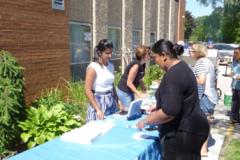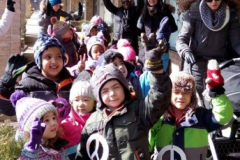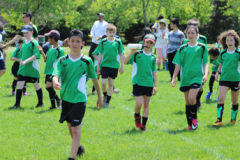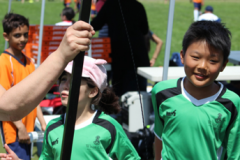Elementary – FAQs
Forward
The nature of the child is the primary consideration when the content of the Montessori elementary environment is being prepared. The child recapitulates the development of humanity in his own growth. Translated into age levels this means that before the age of six, he wants to name everything he possibly can. Now he wants to know WHAT and WHERE … he is primarily interested in REASONS, EXPLANATIONS and TIME PERSPECTIVE. Other “sensitive periods” at this age involve ABSTRACTION and IMAGINATION. SOCIAL attitudes become directed towards the child’s peer group. The period before age six lays the foundation for the period after age six.
Questions
How is the Montessori approach to elementary learning different?
What is meant by an “enriched curriculum”?
In addition to acquiring the “basic skills” and being exposed to an “enriched curriculum”, what are the other advantages to the programme?
Does the Montessori programme foster creativity?
How does the programme provide for the development of “socialization” skills?
How well does a child make the transition from a Montessori programme to another programme?
—
How is the Montessori approach to elementary learning different?
Children as a group, are different from adults, and as individuals, they are different from each other. They should be respected as such and the educational environment should be designed to respect their differences. Montessori is not interested in accelerating mental growth, but in helping each child to fulfill his potential. The way to facilitate the fastest possible attainment of this goal is to help the child follow his own inner time clock for development, for it is the child who must develop himself. No one person can “do” the development of another. The Directress acts as the catalyst, not as a creator, on the child’s development of himself.
Montessori considers the life of the child to be a developmental continuum — each stage having its base in the preceding one — each stage preparing for the next. The individualized programme and enriched curriculum make the programme unique. Allowing three years in the programme provides the child freedom to develop his intellectual abilities at his own pace and in his own style. The teacher is really given the opportunity to know the child well. There is also an opportunity for the teacher and parent to work closely together on what is best for the child..
What is meant by an “enriched curriculum”?
Giving too much unrelated material in a curriculum may be just as detrimental as giving too little. Our Montessori curriculum attempts to strike a balance between the two extremes by providing a skeletal curricular framework that is OPEN-MINDED.
Montessori curriculum is “enriched” because the cultural subjects (Anthropology, Astronomy, Botany, Biological Sciences, Chemistry, Geography, Geology, Government, History etc.) are not broken down into separate subject matters, but are treated as totally integrated curriculum.
The development of skills in Mathematics, Language, Writing, Arts and Crafts, Movement, Foreign Language etc. is integrated as much as possible with the enriched curriculum.
In general, concepts presented take a historical line. They are presented in the order in which the concept, discovery or invention emerged or occurred. Biology studies are structured in such a way as to give the child the classification of plants and animals so he can relate the facts of biology to a framework. Often times live representations are used. For example, during the study of the five classes of animals, the children will study the pets in the classroom, and may also visit a pet store, exhibition, etc. to observe more varieties and get answers to questions from experts in those fields. The ultimate goal is an ecological view of life and a feeling of responsibility for the environment. The study of History follows the development of the solar system, life on earth, the development of man, early civilization and recorded history. The child adds the long development which preceded the arrival of man, and then the long labor of man to accomplish all that is here for present day mankind to enjoy. The study of Geography is designed to show how the physical configurations of the earth contribute to the history of mankind. The study of physical Geography and Geology is the basis for the study of Economic Geography – which show the inter-dependence of all men. Through the study of biological Science (plants and animals), it is hoped that the child sees the struggle of life to develop itself, how it has benefited him and his place in the development and responsibility to develop it further. The human relations curriculum has “The Fundamental Needs of Man” as its organizing centre. Through this, the child is helped to see that the needs of man in all places on earth and in all time in history are the same. This understanding helps to establish the idea of the brotherhood of man. When the child can see that the needs of man are the same, then he can respect and appreciate the variety of ways in which the needs are met.
In addition to acquiring the “basic skills” and being exposed to an “enriched curriculum”, what are the other advantages to the programme?
Each child is given a contract for the day which details certain assignments to be completed at the child’s pace. In addition, each child has the possibility of making choices and pursuing those choices. Large, uninterrupted time blocks are provided in order to allow each child to pursue his work to his end and satisfaction. In this manner, a natural work cycle and long concentration span develop which is refreshing, not fatiguing, to the child. The child learns responsibility for the management of his time and completing his work by the end of the day. Self-motivation and responsibility are acquired for a lifetime.
In addition to a weekly art project, materials for creativity are available continually. Paints, paper, glue, crayons, markers, scissors, etc… are available throughout the day. Children are responsible for setting up the classroom for lunch and also, cleaning up after lunch.
Gym, Computer Study, French and Music are an integral part of the curriculum. Library visits are encouraged, as needed (i.e. research). Plans are always being formulated which will be of maximum benefit to the development of a well-rounded child in all areas.
The most important element in White Oaks Montessori School’s Elementary programme is the Directress, who puts a tremendous amount of time and energy into developing the programme and meeting the individual needs of the children on a daily basis.
Does the Montessori programme foster creativity?
Experience tells us that “creating” cannot be taught and that the child’s environment tends to either foster or restrict his creative potential. To foster creativity, Montessori realized that the environment must itself be beautiful, harmonious and based on reality in order for the child to organize his perception of it. Then the child is capable of selecting and emphasizing those processes necessary for creative endeavors. The child needs freedom if he is to develop creativity which is involved with the intellectual as well as the aesthetic processes of the mind.
The child in the Montessori classroom is free from the judgment by an outside authority that so inhibits the creative impulse.
How does the programme provide for the development of “socialization” skills?
Montessori education fosters a community feeling. Every child is a part of that community and takes pride not only in his own personal accomplishments, but also in the accomplishments of his classmates. Since the classroom provides for movement from one area to another, there is a continual opportunity for interaction between the child and his peers.
Non-competitiveness is fostered since each child works at his own level. There is the opportunity for children to work together on projects or in small groups. Lunch is a time that takes on a very social atmosphere, as well as recess.
In general, many more opportunities are available for social interactions in a Montessori classroom than in a traditional setting..
How well does a child make the transition from a Montessori programme to another programme?
Montessori children are quite adaptable, since they have learned to work independently, without constant supervision, and more often than not, feel good about themselves and their ability to integrate well with others. There is a general agreement that Montessori children are more confident, independent, self-directed, possess more initiative and often show more originality and creativity.
Learn more about our elementary Montessori school in Mississauga here!





